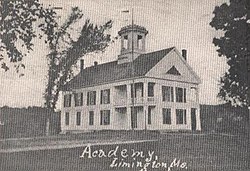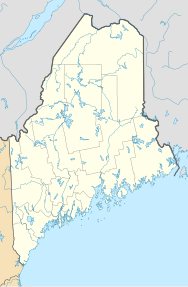Limington, Maine
| Limington, Maine | |
|---|---|
| Town | |

Limington Academy, c. 1904
|
|
| Location within the state of Maine | |
| Coordinates: 43°44′2″N 70°42′9″W / 43.73389°N 70.70250°W | |
| Country | United States |
| State | Maine |
| County | York |
| Incorporated | 1792 |
| Area | |
| • Total | 43.29 sq mi (112.12 km2) |
| • Land | 41.92 sq mi (108.57 km2) |
| • Water | 1.37 sq mi (3.55 km2) |
| Elevation | 381 ft (116 m) |
| Population (2010) | |
| • Total | 3,713 |
| • Estimate (2012) | 3,737 |
| • Density | 88.6/sq mi (34.2/km2) |
| Time zone | Eastern (EST) (UTC-5) |
| • Summer (DST) | EDT (UTC-4) |
| ZIP code | 04049 |
| Area code(s) | 207 |
| FIPS code | 23-39405 |
| GNIS feature ID | 0582558 |
| Website | www |
Limington is a town in York County, Maine, United States. The population was 3,713 at the 2010 census. Limington is a tourist destination with historic architecture. It is part of the Portland–South Portland–Biddeford, Maine metropolitan statistical area.
In 1668, Francis Small traded goods with the Newichewannock tribe of this area. Their Chief Wesumbe, also known as Captain Sunday, was friendly with Small and warned him of a plot against his life. A group of renegade tribesmen planned to murder Small rather than pay him the furs they owed him. Small escaped after watching his trading post in what is now Cornish burn to the ground. The chief made up for the loss by selling Small all the lands bounded by the Great and Little Ossipee Rivers, the Saco River and the New Hampshire border. Known as the Ossipee Tract, it comprised the present-day towns of Limington, Limerick, Cornish (formerly Francisborough), Newfield, Parsonsfield and Shapleigh (which then included Acton).
First called Little Ossipee Plantation (after Ossapee, its original Abenaki name), it was settled by Deacon Amos Chase, who removed here and built a mill in 1773 at the mouth of the Little Ossipee River. Ezra Davis and Jonathan Boothby followed him in 1774, and John McArthur and Joshua Small in 1775. Little Ossipee Plantation was incorporated on February 9, 1792 as the town of Limington. It was named after Limington in Somerset, England, the home county of Sir Ferdinando Gorges, Lord Proprietor of Maine. As the surface of the land was rocky and broken, in 1798 nearly 2,000 acres (8.1 km2) of land were annexed from Little Falls Plantation (Hollis). In 1870, about 1,500 acres (6.1 km2) of land were ceded to Limerick.
...
Wikipedia

